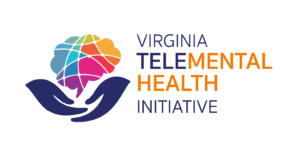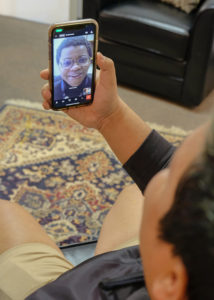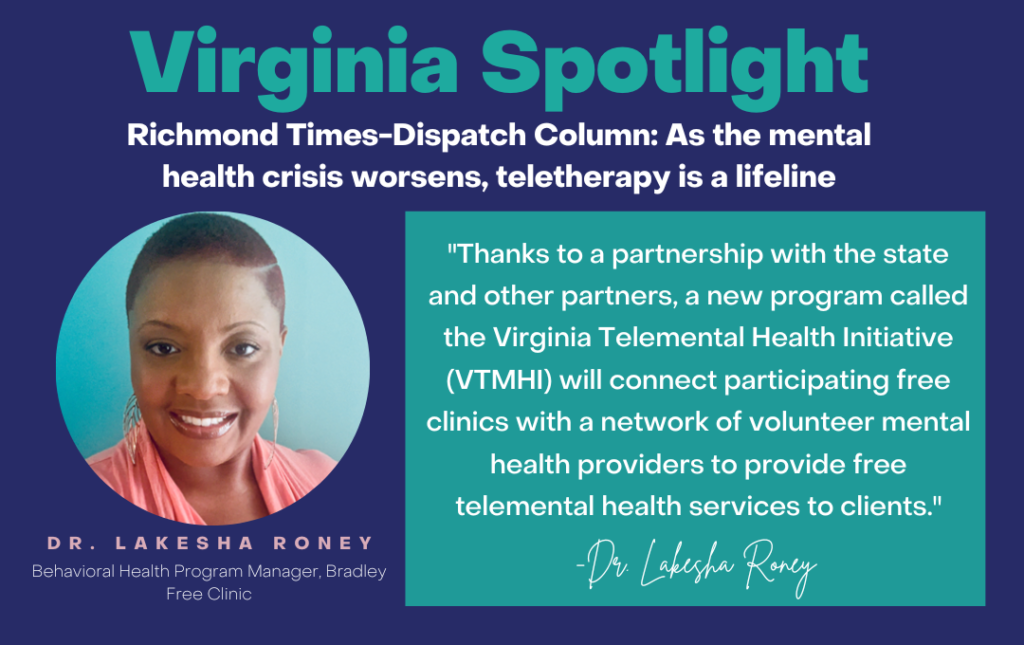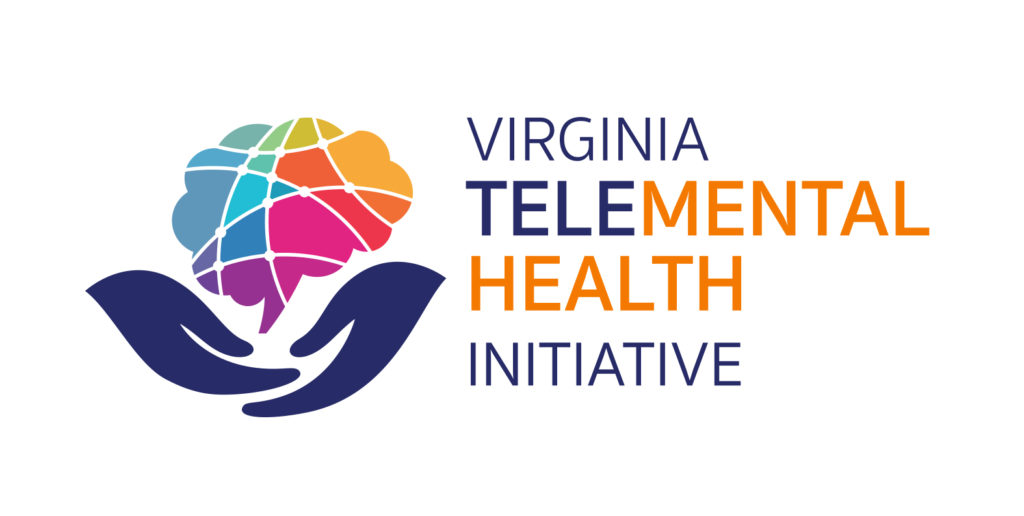There is a great need for behavioral and mental health services in Virginia. A Mental Health America report ranked Virginia 39th nationwide when it comes to the availability of mental health services for adults, with 125 out of 133 cities and counties in the state designated as Mental Health Professional Shortages Areas.

To help expand access to care and address staffing shortages, VTN led the development and launch of the Virginia Telemental Health Initiative (VTMHI), a pro-bono program focused on meeting the mental health needs of Virginians who are medically underserved and cannot access care due to limited income, being un- or under-insured, and provider shortages.
 Increasing Access to Care
Increasing Access to Care
Recently, VTMHI began seeing patients through six participating free and charitable clinics, including Fauquier Free Clinic, Bradley Free Clinic in Roanoke, Brock Hughes Medical Center in Wytheville, Health Brigade in Richmond, Charlottesville Free Clinic, and Free Clinic of Franklin County. Additional clinics will join the initiative on a rolling basis throughout 2023.
The free services are supported by volunteer mental health providers and offer a range of therapies, including those for patients experiencing symptoms of depression and anxiety and other behavioral and mental health concerns. All services are provided virtually through telehealth, a secure and increasingly popular patient-provider arrangement that grew exponentially during the COVID-19 pandemic, to enrolled patients at participating free and charitable clinics.
“This innovative program addresses a critical need across the Commonwealth, particularly for Virginians whose income levels put vital mental health services out of reach,” said Nelson Smith, Commissioner, Virginia Department of Behavioral and Developmental Services (DBHDS), a key supporter of the initiative. “VTMHI reflects our underlying commitment toward ensuring the most vulnerable and overlooked populations in Virginia have access to the highest quality care, including in the critical realm of mental health services.”
Supporting Virginia’s Next Generation of Mental Health Providers
To help expedite licensure, VTMHI matches volunteer pre-licensed mental health providers (pre-LMHPs) who have completed graduate-level coursework with supervisors to achieve needed client contact hours while providing pro-bono support to free and charitable clinics. In addition, a robust curriculum of virtual training and educational resources regarding telehealth are available at no cost to program volunteers. The program structure aims to enhance workforce development across Virginia.
VTMHI is accepting volunteer applications to participate in the program when more free and charitable clinics join the initiative during spring 2023. Information about eligibility, volunteer requirements, and how to apply for candidates in the process of meeting licensure requirements can be found on VTMHI’s website.
As the program grows, VTMHI also will onboard volunteer licensed mental health providers. Opportunities for licensed individuals to volunteer include serving as a virtual therapist to free and charitable clinic patients via telehealth, an advisor on program development, or as an expert for providing didactic training. Licensed providers interested in getting involved can learn more here.
Impacting the Lives of Virginians
Though telehealth can come with its challenges – like limited access to broadband or technology – we’ve heard many success stories about how health care providers across Virginia have been able to address inequities in health care with virtual offerings. And in just two months of patients receiving care through VTMHI, we’re seeing an impact.
“Since the launch of VTMHI, we have been able to offer an initial counseling visit to patients within 24 hours in most cases,” said Shannon Raybuck, Mental Health Care Coordinator at Fauquier Free Clinic. “This has been immensely helpful for patients who have recently been discharged from inpatient psychiatric care or have a more urgent need.”
 Christine Wright, Behavioral Program Manager at Bradley Free Clinic also spoke to how the VTMHI program has helped get patients off of the clinic’s mental services wait list and get quick access to care during a Here at Home segment on WDBJ7.
Christine Wright, Behavioral Program Manager at Bradley Free Clinic also spoke to how the VTMHI program has helped get patients off of the clinic’s mental services wait list and get quick access to care during a Here at Home segment on WDBJ7.
An op-ed published in the Richmond Times-Dispatch by VTMHI’s own clinical supervisor, Dr. Lakesha Roney, speaks to the benefits of increasing access to mental health services via telehealth.
“It’s been a one-two punch,” Lakesha writes. “On the heels of the opioid epidemic, the abiding impact of COVID has accelerated a rash of social stressors like anxiety and depression. Stress and trauma related to finances, health and family are fueling the need for professional help — help that all too often is unavailable, unaffordable, or inaccessible. For many, the best way to access mental health care is by way of telehealth.”
For more information about eligibility requirements and how Virginia residents can access mental health services through VTMHI, visit https://virginiatelementalhealth.org/accesscare/.
Thanks to VTMHI’s Partners
VTN launched VTMHI in collaboration with the Department of Behavioral Health and Developmental (DBHDS), Virginia Association of Free and Charitable Clinics (VAFCC), the University of Virginia Karen S. Rheuban Center for Telehealth (UVA Center for Telehealth), and the Mid-Atlantic Telehealth Resource Center (UVA Center for Telehealth).

